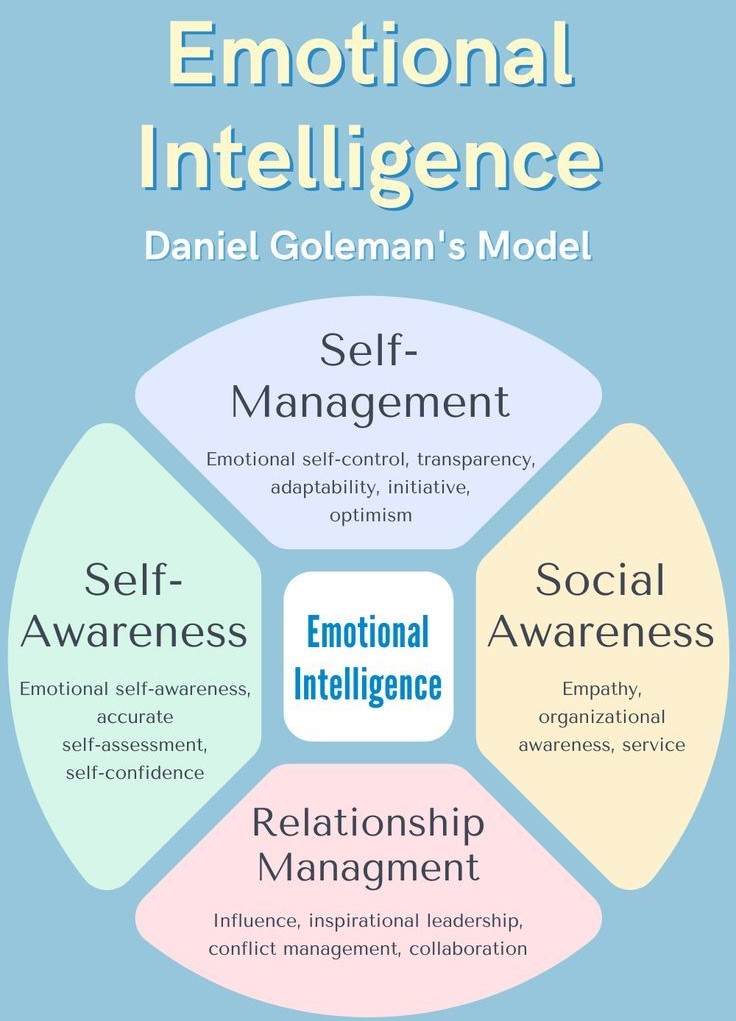In the dynamic and competitive landscape of the modern workplace, technical skills and academic achievements are no longer the sole predictors of career success. Employers are increasingly recognizing the pivotal role of EI in shaping the trajectory of one’s professional journey. This article explores the profound impact of emotional intelligence on career success, shedding light on how individuals can harness this essential skill set to thrive in their respective fields
Understanding Emotional Intelligence
Emotional intelligence encompasses a range of interpersonal and intrapersonal skills that enable individuals to navigate social complexities, understand and manage their own emotions, and effectively interact with others. The concept was popularized by psychologist Daniel Goleman model, who identified five key components: self-awareness, self-regulation, motivation, empathy, and social skills.

Self-Awareness:
Career success begins with self-awareness—an understanding of one’s strengths, weaknesses, and emotional triggers. Individuals with high emotional intelligence possess the ability to recognize their emotions and how these feelings may influence their behavior. This self-awareness provides a solid foundation for personal and professional growth.
In the workplace, self-awareness translates to better decision-making and conflict resolution. Leaders who understand their emotional responses can navigate challenges more effectively, fostering a positive and productive work environment.
Self-Regulation:
Emotional intelligence empowers individuals to regulate their emotions, preventing impulsive reactions in high-pressure situations. This skill is particularly crucial in the professional realm, where stress and deadlines can often create tense environments. By mastering self-regulation, employees can maintain composure, make informed decisions, and build trust among colleagues and superiors.
Motivation:
Motivation, a key component of emotional intelligence, propels individuals toward achieving their goals. Motivated professionals demonstrate resilience in the face of setbacks and maintain a positive outlook. This intrinsic drive not only fuels personal success but also inspires and influences colleagues, creating a culture of dedication and perseverance within the workplace.
Empathy:
Understanding and sharing the feelings of others is a hallmark of empathy, a critical aspect of emotional intelligence. In a professional context, empathy facilitates effective communication, teamwork, and leadership. Leaders with high levels of empathy can connect with their teams on a deeper level, fostering a sense of unity and collaboration that enhances overall workplace performance.
Social Skills:
The ability to navigate social situations and build meaningful relationships is a testament to strong social skills—a component of emotional intelligence. In the professional realm, effective communication, conflict resolution, and negotiation are all enhanced by social intelligence. Professionals who excel in this area often find themselves at the forefront of networking opportunities, creating a ripple effect that positively impacts their career advancement.
The Tangible Benefits of Emotional Intelligence
The impact of emotional intelligence on career success is undeniable. Studies have consistently shown that individuals with high emotional intelligence are more likely to be successful leaders, have higher job satisfaction, and experience greater overall well-being. Employers are increasingly recognizing the value of emotional intelligence during recruitment, seeking candidates who not only possess technical expertise but also the ability to navigate complex social dynamics.
Developing Emotional Intelligence for Career Growth
Fortunately, emotional intelligence is not a fixed trait but rather a skill set that can be cultivated and refined over time. Individuals can enhance their emotional intelligence through self-reflection, feedback from peers, and dedicated efforts to understand and connect with others. Training programs and workshops focused on emotional intelligence can also provide valuable insights and practical tools for professional development.
Conclusion
In a world where success is not solely determined by technical prowess, emotional intelligence emerges as a powerful catalyst for career advancement. The ability to understand and manage emotions, navigate social complexities, and build meaningful relationships sets the stage for sustained professional growth. As individuals and organizations increasingly recognize the profound impact of emotional intelligence, investing in the development of these skills becomes not only a personal pursuit but a strategic imperative for unlocking the full potential of one’s career.
